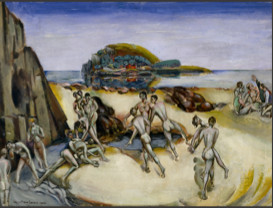Wyndham Lewis (1882-1957), The Island (1942)
In The Island, Wyndham Lewis depicts a deconstructed world that is in conflict with modernity – not because of modernization in itself, but because of the constant struggle to find what he called the “instinctive,” “genuine” way of expressing it. For Lewis, this means of expression was through vorticism, an artistic movement headed by Lewis and Ezra Pound whose aim was to depict the all-consuming nature of a rapidly moving and changing world from a still point, or vortex. Well known for his aversion to conformity, Lewis here expresses this unique style – one that is free of “conventional limitations,” that contains “surprise and primitive detachment,” and that could be attempting to re-humanize the modern world in a new, unexplored way.
The composer Pierre Boulez creates music in a similar fashion; he favors violent, explosive music that almost attacks listeners without their consent in the same way that Lewis’s artwork forcibly draws viewers without theirs.
“…just as the old form of egotism is no longer fit for such conditions as now prevail, so the isolated human figure of most ancient Art is an anachronism.
THE ACTUAL HUMAN BODY BECOMES OF LESS IMPORTANCE EVERY DAY.
It now, literally, EXISTS much less.
Love, hatred, etc., imply conventional limitations.
All clean, clear cut emotions depend on the element of strangeness, and surprise and primitive detachment.
Dehumanization is the chief diagnostic of the Modern World.”
– “The New Egos” by Wyndham Lewis, BLAST Magazine (1914)
Here, Lewis discusses whether or not his art is “unorthodox.”
Case Study
Robert Kleeman was born in Chelsea, London, England in 1894. He was born into a wealthy family and lived a comfortable life with his parents Charles and Margaret and his younger brother Joseph. At the age of eighteen, he began attending King’s College London, where he studied philosophy and literature in the hopes of one day becoming a lawyer. His studies were interrupted, however, by the outbreak of World War I. Robert, then twenty, enlisted, along with then-eighteen year old Joseph. But then disaster struck – Joseph was killed in battle, and so Robert returned home alone and heartbroken. The death of his brother affected him greatly, and he refused to go back to King’s College and abandoned his dreams of pursuing a career in law. He instead turned to writing as a method of organizing his thoughts and picking up the pieces of his life left over after the end of the war. He moved away from Chelsea and lived in Manchester for a few years, but then decided that he needed to leave England altogether and moved to Paris to focus on his literary career. Now twenty-seven, Robert has dedicated his life to writing about his experiences and the affects of war on daily life in France and England. He struggles with occasional flashbacks of the trauma he endured, and evidence of this appears in his written works. However, despite Joseph’s death, Robert reluctantly maintains that the war was fought in England’s best interest and that the country did not have a choice in terms of participating. He is a firm proponent of English nationalism, and travels to England frequently to give lectures at universities about his experiences on the battlefield, as well as about his brave brother’s sacrifice. Robert recently married an Englishwoman named Barbara and moved with her to Nice, France. Together they have a one-year-old daughter named Maisie.
Categories: Adult Perspective, Colonialism, Cubism, Futurism, Male Perspective, Nature, Surrealism, The Body, Urbanism and Industrialization, War



